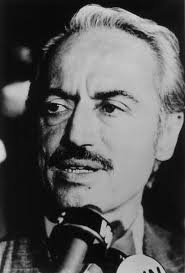Congratulations to the newest members of the Hall of Fame.
The first wave of inductees for the 2014 Baseball Hall of Fame class have been announced. The Veteran’s Committee has decided to induct managers Joe Torre, Bobby Cox, and Tony La Russa:
The newest members of the @BaseballHall of Fame: pic.twitter.com/BUaGGvtBGl
— MLB Public Relations (@MLB_PR) December 9, 2013
All three managers were inducted unanimously by the 16-man committee, and absolutely no one should be shocked. They are all extremely well-loved in baseball circles and rank 3rd (La Russa, 2,728), 4th (Cox, 2,504), and 5th (Torre, 2,326) all-time in managerial wins.
All three are deserving, no question about it. However, the joy of seeing those deserving candidates get enshrined is greatly tempered by the sadness of the one that didn’t.
The other people who were on the ballot were Dave Concepcion, Steve Garvey, Tommy John, Billy Martin, Dave Parker, Dan Quisenberry, Ted Simmons, Steinbrenner, and Marvin Miller. Of these nominees, I’m of the opinion that Simmons, John, and Steinbrenner should probably be honored in Cooperstown one way or another, but the biggest crime of all is the continued dismissal of the late Marvin Miller. It is a complete and utter joke that the Hall of Fame claims to honor the biggest figures in the history of baseball but has never done anything for Miller. Dayn Perry over at CBS Sports nicely sums up Miller’s slam-dunk case:
Miller is the man who, armed with his training as an economist for the United Steelworkers of America, forged the MLBPA into something more than a handmaiden to ownership, something more than a “company union.” Recounting the gains made by the players under Miller would take too much bandwidth (and keep in mind that bandwidth is not especially finite). Most notably, though, he methodically and relentlessly attacked the reserve clause — the patently unfair system that yoked a player to one team for life or until the team was done with him.
Finally, in 1975, thanks to the “test cases” of Andy Messersmith and Dave McNally, the reserve clause was overturned by arbitrator Peter Seitz, and free agency in baseball was born. In part because of that and in part because Miller was able to persuade owners to accept salary arbitration, the average major-league salary increased tenfold during Miller’s tenure. And that’s to say nothing of the pension system he created — one that’s the envy of athletes in other professional sports.
All of those are good things, both on the principle of economic freedom and in terms of making MLB a more attractive destination for athletic talent around the world. Contrary to popular misconception, free agency also improved parity and competitive balance across the league.
The players’ union was an absolute joke when Miller took over. By the time he left office, players had far more rights than ever before. The nigh-century old reserve clause was a complete injustice; Miller’s hard-fought case against it eventually led to its elimination. Average salary increased by 1,616% during his tenure. (No, that is not a typo.) Players were previously unable to file grievances against owners. As previously mentioned, anyone arguing Steinbrenner’s case better be arguing for Miller’s too, since free agency, the very institution that Steinbrenner capitalized on, would not have been possible without Miller. Miller changed the game for the better, but his continued to exclusion is why people like Hardball Talk’s Craig Calcaterra have legitimate reasons to completely dismiss the Hall’s validity (emphasis mine):
The direct problem is one I’ve mentioned many times before, and that’s the horrendous exclusion of Marvin Miller. He’s been passed over multiple times now, and he’s probably never getting in. I’ve accepted that. I’ll never accept, however, that the Hall of Fame is anything approaching legitimate without Miller’s inclusion. Many owners, executives and commissioners — many feckless at best, some actively harmful to the game — are in the Hall. Very few of them if any have had as big an impact on how baseball operates than Miller.
Bowie Kuhn, the crappy commissioner who Miller constantly fought and triumphed over multiple times, is in the Hall of Fame while Miller remains outside. That is just completely baffling. What’s worse is that Miller apparently received even fewer votes than he did during his last vote in 2010: six at most. Coincidentally, the 16-man committee had six former players on it. Rod Carew, Carlton Fisk, Joe Morgan, Paul Molitor, Phil Niekro, and Frank Robinson better all have voted for Miller, if not only due to his effect on their salaries. The remainder of the committee consisted of managers Whitey Herzog and Tommy Lasorda, historians Steve Hirdt, Bruce Jenkins, Jack O’Connell, and Jim Reeves, and executives Andy MacPhail, Dave Montgomery, Jerry Reinsdorf, and Paul Beeston. Even if all four executives on the ballot decided to screw Miller over for what he did to them over the years, the remainder of the voting bloc could still have inducted him with the requisite 12 votes. Hirdt, Jenkins, O’Connell, and Reeves don’t deserve the title of “historian” if they didn’t vote for Miller, given how much Miller did to impact baseball history. We might never see a Hall of Fame without Marvin Miller. and until he’s elected, that gross fact likely stands as Cooperstown’s biggest failure.
I agree completely. I wish I knew what it would take to fix this massive oversight, but then the Hall of Fame stopped making sense years ago. Think Progress and Linkmeister have more.

